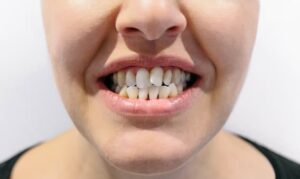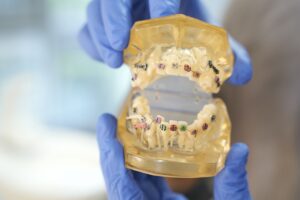Crowded teeth, also known as dental crowding, occur when there isn’t enough space in your mouth for all your teeth to fit properly. This can cause teeth to overlap, twist, or bunch together. While some people may not mind the look of crowded teeth, others wonder if it can cause problems. In this article, we’ll explore whether crowded teeth are bad for your health, if they need to be fixed, and how they can be treated.
Is It Okay to Have Overcrowded Teeth?

Having crowded teeth isn’t uncommon, and many people live with them without serious issues. However, dental crowding can lead to certain challenges, both functional and cosmetic.
Potential Problems with Crowded Teeth:
- Difficulty Cleaning Teeth:
Crowded teeth can make it hard to brush and floss properly. When some teeth are out of alignment, it creates tight spaces where plaque and food particles can hide, increasing the risk of cavities and gum disease. - Gum Problems:
Misaligned teeth may put extra pressure on the gums, causing inflammation or even recession over time. - Bite Issues:
Crowded teeth can affect your bite, leading to uneven pressure when chewing. Over time, this may cause jaw pain or even temporomandibular joint (TMJ) issues. - Speech Difficulties:
In some cases, severe crowding can interfere with how you speak, leading to a lisp or other issues. - Self-Confidence:
Some people feel self-conscious about the appearance of crowded teeth, which may impact their confidence in social situations.
When Crowded Teeth Are Less of a Concern:
If the crowding is mild and doesn’t interfere with cleaning or cause discomfort, it may not require immediate treatment. However, regular dental checkups are essential to monitor the situation.
How Do You Fix Crowded Teeth?

There are several ways to address crowded teeth, depending on the severity of the problem and your personal preferences. Modern dental techniques make it easier than ever to achieve a straighter smile.
Treatment Options for Crowded Teeth:
- Braces:
Traditional braces use metal brackets and wires to slowly move teeth into the correct position. They’re highly effective for severe crowding. - Invisalign or Clear Aligners:
For mild to moderate crowding, clear aligners like Invisalign are a popular option. These removable trays are less noticeable than braces and work gradually to straighten teeth. - Tooth Extraction:
In cases where the jaw is too small to fit all the teeth, a dentist or orthodontist may recommend removing one or more teeth to create space. - Palate Expanders:
For children and teens, a palate expander can widen the upper jaw to create more room for crowded teeth. - Veneers or Bonding:
For very mild cases, cosmetic procedures like veneers or dental bonding can improve the appearance of teeth without moving them. - Surgery:
In rare cases, surgical intervention may be needed to correct severe crowding or jaw alignment issues.
Do Crowded Teeth Need to Be Removed?
The decision to remove teeth due to crowding depends on the severity of the problem and the treatment plan. Tooth removal isn’t always necessary, but it can be a helpful solution in certain situations.
When Tooth Removal Is Recommended:
- Severe Crowding:
If there isn’t enough room in your jaw for all your teeth, extracting one or more teeth may be the only way to create space. - Impacted Teeth:
Sometimes, crowded teeth can cause other teeth (like wisdom teeth) to become impacted, meaning they don’t fully emerge from the gums. This may require removal. - Orthodontic Treatment:
In some cases, orthodontists recommend removing teeth to make braces or aligners more effective.
When Tooth Removal Is Avoided:
- Dentists and orthodontists try to preserve natural teeth whenever possible. If there’s enough room to move teeth into alignment using braces or aligners, extraction may not be necessary.
Do Crowded Teeth Get Worse with Age?

Unfortunately, crowded teeth often become worse over time if left untreated. This is because teeth naturally shift as we age, and crowding can cause a domino effect, leading to further misalignment.
Why Do Crowded Teeth Get Worse?:
- Natural Tooth Movement:
Teeth are always moving slightly, even in adults. As we age, this movement can lead to increased overlap or twisting of teeth. - Wisdom Teeth:
When wisdom teeth try to emerge, they can push against existing teeth and worsen crowding. - Gum Disease:
If crowded teeth make cleaning difficult, plaque buildup can lead to gum disease. This can weaken the bone and tissues supporting teeth, causing them to shift or loosen. - Grinding or Clenching:
Habits like teeth grinding or clenching put pressure on teeth, which can contribute to misalignment over time.
How to Prevent Crowding from Getting Worse:
- Early Intervention:
Addressing crowding during childhood or teenage years can prevent it from worsening in adulthood. - Retainers:
After orthodontic treatment, wearing a retainer helps maintain the results and prevents teeth from shifting back. - Good Oral Hygiene:
Brushing, flossing, and regular dental checkups can help prevent gum disease and other issues that may lead to shifting teeth.
Should You Be Concerned About Crowded Teeth?
Crowded teeth aren’t always a serious problem, but they can lead to long-term oral health issues if left untreated. Even if the crowding doesn’t bother you cosmetically, it’s worth discussing with a dentist or orthodontist to ensure your teeth and gums stay healthy.
Key Questions to Consider:
- Are your crowded teeth hard to clean?
- Do you experience jaw pain, discomfort, or difficulty chewing?
- Are you unhappy with the appearance of your teeth?
If you answered yes to any of these questions, it may be time to explore treatment options.
Final Thoughts
Crowded teeth can cause a range of issues, from difficulty cleaning to potential jaw pain. While mild crowding may not require immediate attention, severe cases often need orthodontic treatment to prevent further complications. The good news is that there are many effective ways to fix crowded teeth, from braces and clear aligners to less invasive cosmetic solutions.
If you’re unsure whether your crowded teeth need treatment, consult with a dental professional. They can provide personalized advice and help you decide on the best solution for a healthier, straighter smile.


 Due to recent weather-related closures and delays, select Lane & Associates Family Dentistry offices will have adjusted hours this Friday, January 30th. Some locations will be closing at 2:00 PM, while others will remain open until 5:00 PM. Please contact your local Lane & Associates office to confirm hours and availability.
Due to recent weather-related closures and delays, select Lane & Associates Family Dentistry offices will have adjusted hours this Friday, January 30th. Some locations will be closing at 2:00 PM, while others will remain open until 5:00 PM. Please contact your local Lane & Associates office to confirm hours and availability.